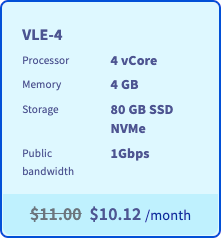How to choose a VPS provider
Opulent Bots and our agents, affiliates, officers, and so on will not provide support for purchasing a VPS, setting up a VPS or managing a VPS!
Choosing the right Virtual Private Server (VPS) provider is essential for ensuring optimal performance, reliability, and security for your online projects. With numerous providers available in the market, selecting the best one can be a daunting task. To help you make an informed decision, we've compiled a comprehensive guide outlining key factors to consider when choosing a VPS provider.
Choose a VPS that matches our recommended system performance:
- at least 2 CPU cores
- at least 3 GB RAM
- at least Windows Server 2022
For example, the following VPS package is recommended when choosing the OVHCloud provider:

How to choose a provider
1. Performance and Reliability
-
Hardware Infrastructure Evaluate the provider's hardware infrastructure, including server specifications, network connectivity, and data center facilities. Look for providers using high-performance servers equipped with SSD storage and redundant network connections to ensure fast and reliable performance.
-
Uptime Guarantee Check if the provider offers an uptime guarantee, indicating the percentage of time their servers are expected to be operational. Choose a provider with a robust uptime guarantee (e.g., 99.9% uptime) to minimize downtime and ensure uninterrupted access to your VPS.
2. Scalability and Resource Allocation
-
Scalability Options Consider your future growth needs and choose a provider that offers scalable VPS solutions. Look for providers that allow you to easily upgrade or downgrade your resources (CPU, RAM, storage) as your requirements change, without downtime or data loss.
-
Resource Allocation Ensure that the provider allocates dedicated resources for each VPS instance, rather than overselling server resources. This ensures consistent performance and prevents resource contention among users sharing the same physical hardware.
3. Security and Data Protection
-
Data Center Security Verify the security measures implemented at the provider's data centers, including physical security, access controls, and surveillance systems. Choose providers with ISO-certified data centers and compliance with industry security standards.
-
Network Security Assess the provider's network security measures, such as firewalls, intrusion detection/prevention systems (IDS/IPS), and DDoS mitigation. Ensure that the network infrastructure is protected against cyber threats and unauthorized access.
4. Technical Support and Customer Service
-
24/7 Support Select a provider that offers 24/7 technical support to address any issues or inquiries promptly. Look for providers with knowledgeable support staff available via multiple channels, such as live chat, email, and phone.
-
Response Time Evaluate the provider's response time and resolution process for support tickets. Choose a provider with a proven track record of quick response times and effective resolution of technical issues.
5. Pricing and Value for Money
-
Transparent Pricing Review the provider's pricing structure and ensure that there are no hidden fees or extra charges. Compare the pricing plans of different providers to determine the best value for your budget.
-
Features and Add-ons Consider the additional features and add-ons included in the VPS plans, such as control panel options, backup solutions, and managed services. Assess whether these features align with your requirements and provide value for money.
Conclusion
Choosing a good VPS provider requires careful consideration of various factors, including performance, scalability, security, customer support, and pricing. By evaluating these criteria and conducting thorough research, you can select a reliable and reputable provider that meets your needs and ensures a seamless VPS hosting experience.